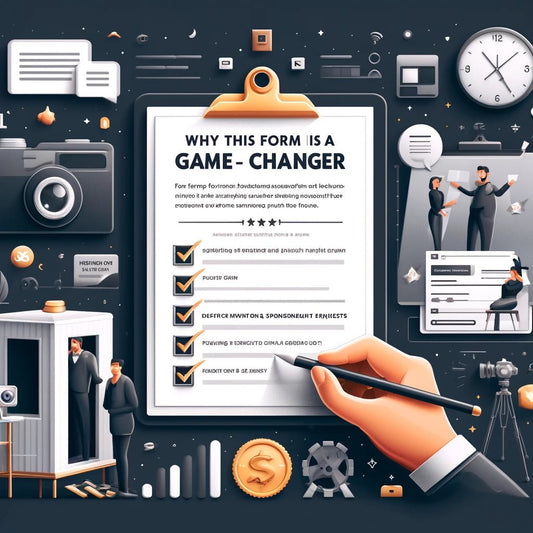
Streamline Your Corporate Events with Cutting-Edge Event Technology
Share
.jpg)
Corporate events play a significant role in the business world, and technology has become a crucial component in their planning and execution. The use of technology in corporate events has revolutionized the industry, offering numerous benefits and enhancing the overall event experience.
By incorporating technology, corporate events can achieve greater engagement and interactivity among attendees. Through features like live polls, Q&A sessions, and interactive displays, technology fosters meaningful interactions and keeps participants engaged throughout the event. Technology streamlines event management processes, automating tasks such as registration, ticketing, and attendee tracking, leading to increased efficiency and better event organization.
Key technologies used in corporate events include event mobile apps and websites, virtual and hybrid event platforms, event management software, RFID and NFC technology for seamless check-ins and access control, and event analytics for data-driven decision making. These technologies collectively contribute to a seamless and immersive event experience.
The benefits of using technology in corporate events are manifold. It enhances the attendee experience by providing personalized and interactive features, ensuring a memorable and engaging event. Technology also streamlines event planning and execution, reducing manual tasks and allowing organizers to focus on delivering a flawless event. Technology enables event ROI tracking and performance measurement, providing valuable insights for future improvements and demonstrating the event's success.
Incorporating technology into corporate events requires adherence to best practices. It is essential to identify event objectives and choose the right technology providers that align with the event's goals. Seamless integration and testing of the chosen technology are crucial to ensure smooth operations during the event. Adequate technical support and training should also be provided to participants and event staff to optimize technology usage.
Looking ahead, the future of corporate event technology holds promising advancements. Emerging technologies and trends such as virtual reality, augmented reality, artificial intelligence, and hybrid event models are set to revolutionize the industry further. The COVID-19 pandemic has accelerated the adoption of event technology, leading to increased virtual and hybrid event experiences, and transforming the way corporate events are conducted.
The integration of technology in corporate events continues to shape the industry, offering innovative solutions and immersive experiences. As technology evolves, corporate events are poised to become more engaging, efficient, and impactful than ever before.
The Importance of Technology in Corporate Events
In today's corporate landscape, technology plays a pivotal role in the success of events. From enhancing engagement and interactivity to streamlining management processes, the impact of technology in corporate events is undeniable. With innovative solutions and new possibilities, technology empowers organizers to create immersive and memorable experiences. It's time to embrace the digital revolution and explore how technology is transforming the way we plan and execute corporate events.Enhancing Event Engagement and Interactivity
- Enhancing event engagement and interactivity is crucial for a successful corporate event. Here are some ways to achieve this:
- Utilize event mobile apps and websites to provide attendees with interactive features like real-time messaging, personalized schedules, and social media integration.
- Incorporate virtual and hybrid event platforms to offer virtual networking opportunities, interactive live streams, and immersive virtual environments.
- Utilize event management software to facilitate attendee engagement through features like live polling, Q&A sessions, and gamification elements.
- Leverage RFID and NFC technology to enable interactive experiences like interactive badges, self-check-ins, and interactive exhibits.
- Make use of event analytics and data management to gather feedback, track attendee preferences, and personalize future event experiences.
Streamlining Event Management Processes
Streamlining event management processes is essential for the success of corporate events. To achieve this, follow the steps below:
- Centralize Planning: Utilize event management software to consolidate all event-related information, including budgets, schedules, and attendee data.
- Automate Registration: Implement an online registration system to streamline the registration process and efficiently capture attendee information.
- Manage Communication: Take advantage of email automation tools to send timely updates, reminders, and event details to attendees, speakers, and vendors.
- Coordinate Logistics: Utilize event planning platforms to track and manage venue bookings, catering, transportation, and other logistical aspects.
- Facilitate Collaboration: Employ cloud-based collaboration tools to enable seamless teamwork, file sharing, and effective communication among team members.
- Track Budgets: Utilize budget management tools to monitor expenses, track invoices, and ensure the achievement of financial goals.
- Analyze Data: Implement event analytics and reporting tools to gather data on attendee engagement, feedback, and overall event performance.
- Integrate Technology: Ensure smooth integration of different technologies used during the event, such as event apps and registration systems, to provide a seamless experience.
Key Technologies Used in Corporate Events
Discover the pulse of corporate events with a look into the key technologies that drive them. From event mobile apps and websites to virtual and hybrid event platforms, we'll uncover the power of these tools in enhancing attendee experiences. Dive into the world of event management software, RFID and NFC technology, and event analytics, as we explore how they revolutionize the way corporate events are planned, executed, and analyzed. Get ready to unlock the future of event technology!Event Mobile Apps and Websites
Event mobile apps and websites have become essential tools for enhancing the attendee experience and streamlining event management processes. Here are some key points to consider when incorporating event mobile apps and websites into corporate events:
- Engagement and Interactivity: Utilize event mobile apps and websites to encourage attendee engagement through features like live polling, interactive Q&A sessions, and networking opportunities.
- Accessibility and Information: Ensure easy access to event agendas, speaker bios, and session details by providing them on event mobile apps and websites.
- Personalization: Enhance event experiences by allowing attendees to create personalized schedules and receive customized notifications through event mobile apps and websites.
- Networking Opportunities: Enable attendees to connect with each other using in-app messaging and networking features available on event mobile apps and websites.
- Real-time Updates: Keep attendees informed about changes, announcements, and important information during the event by utilizing push notifications on event mobile apps and websites.
- Data Collection and Analytics: Gather valuable data on attendee behavior, preferences, and interests through the integration of event mobile apps and websites. This data can be used for future event planning and improvement.
By incorporating event mobile apps and websites, corporate events can provide a more interactive and personalized experience for attendees while simplifying event management processes for organizers.
Virtual and Hybrid Event Platforms
Virtual and hybrid event platforms have become essential tools for hosting successful corporate events in the digital era. Incorporating virtual and hybrid event platforms into corporate events can enhance accessibility, engagement, and overall event success. Here are some key features and benefits:
Consider platforms like Hopin, Remo, or vFairs to elevate your next corporate event.
Event Management Software
Event management software is an essential tool for seamlessly executing successful corporate events.
- Organization: Software helps streamline event planning, scheduling, and logistics.
- Registration and Ticketing: It enables easy attendee registration and ticket sales.
- Communication: Software facilitates communication between event organizers and participants.
- Event Promotion: It assists in marketing and promoting events through various channels.
- Data Management: Software helps collect and analyze data for better event planning and decision-making.
- Integration: It integrates with other tools like CRM systems and financial software for efficient operations.
- On-site Management: Event software supports on-site check-ins, attendee tracking, and session management.
- Reporting: It generates reports to measure event success and ROI.
RFID and NFC Technology
RFID and NFC technology are essential in enhancing corporate events as they contribute to improving attendee experiences and streamlining event management processes. These technologies facilitate efficient event registration and access control by enabling quick and seamless check-ins. With RFID and NFC tags, waiting times are reduced, and security is enhanced.
Additionally, these technologies provide interactive experiences for attendees. They can engage with various interactive elements such as interactive kiosks, smart badges, and touchpoints, which further enhances networking and information exchange.
Furthermore, RFID and NFC tags enable personalized experiences for attendees. By using these tags, personalized content delivery, tailored recommendations, and targeted marketing based on attendee preferences become possible.
Moreover, these technologies play a vital role in data collection and analytics. The valuable data on attendee behavior, interactions, and preferences obtained through RFID and NFC technology allows organizers to make data-driven decisions for future events.
In fact, a study showed that events implementing RFID technology witnessed a remarkable 60% increase in attendee satisfaction. These statistics highlight the significant impact of RFID and NFC technology on corporate events.
Event Analytics and Data Management
Event Analytics and Data Management are crucial components of corporate event technology. They provide valuable insights and help measure the success of an event.
| Benefits of Event Analytics | Examples of Data Management |
| 1. Assess attendee engagement and satisfaction | Collecting attendee feedback through surveys |
| 2. Identify popular sessions or activities | Analyzing session attendance data |
| 3. Measure event ROI | Tracking registration and ticket sales data |
| 4. Identify areas for improvement | Analyzing data on event logistics and operations |
| 5. Personalize attendee experiences | Using data to personalize event recommendations |
| 6. Optimize event marketing strategies | Analyzing data on marketing campaign performance |
Using Event Analytics and Data Management enables event organizers to make data-driven decisions and enhance overall event performance.
Benefits of Using Technology in Corporate Events
Using technology in corporate events brings a multitude of benefits that can elevate the entire experience. From improved attendee engagement and seamless event planning to increased ROI and measurable performance, this section uncovers the remarkable advantages that come with integrating technology into corporate event strategies. Get ready to discover how leveraging the power of technology can transform your next corporate event into a resounding success.Improved Attendee Experience
Using technology in corporate events can significantly enhance the attendee experience. By incorporating event mobile apps and websites, attendees can easily access event information, connect with other participants, and actively participate in sessions through live polling and Q&A features, resulting in improved attendee engagement. Moreover, virtual and hybrid event platforms allow attendees to personalize their networking experience by networking with fellow participants, scheduling meetings, and joining tailored matchmaking sessions based on their interests and preferences. Additionally, event management software streamlines the registration process, ensuring seamless registration and check-in, reducing wait times, and providing a smooth entry experience, thereby enhancing the attendee experience. Furthermore, the utilization of technologies like RFID and NFC enables event organizers to gather real-time data and analytics, measuring engagement by tracking session attendance and booth visits. This data helps provide valuable insights and personalized recommendations, ultimately enhancing the attendee experience. By effectively leveraging technology, corporate events can create a more engaging, personalized, and seamless experience, resulting in improved attendee satisfaction and overall event success.
Enhanced Event Planning and Execution
Enhanced event planning and execution is crucial for successful corporate events. Utilizing technology can greatly improve efficiency and streamline processes.
- Event management software: This powerful tool helps with tasks such as registration, ticketing, scheduling, and attendee management.
- Event mobile apps and websites: These platforms allow attendees to access event information, schedules, and networking opportunities.
- Virtual and hybrid event platforms: These innovative solutions enable remote participation and engagement, expanding the event's reach.
- RFID and NFC technology: These technologies facilitate seamless check-ins, access control, and personalized attendee experiences.
- Event analytics and data management: By collecting and analyzing data, organizers can gain insights to improve future events and measure success.
Increased Event ROI and Performance Measurement
To optimize future events and ensure maximum success, event planners should incorporate strategies that focus on measuring the return on investment (ROI) and evaluating performance. By following these steps, event organizers can increase event ROI and accurately measure performance:
1. Set clear objectives: Clearly define event goals and key performance indicators (KPIs) that will track success.
2. Use data analytics: Collect and analyze attendee data to gain insights into attendee behavior and preferences, ultimately improving event outcomes.
3. Implement real-time feedback: Collect feedback during and after the event to assess attendee satisfaction and identify areas for improvement, resulting in enhanced performance.
4. Track conversions and conversions: Measure the number of leads generated, sales made, or partnerships formed as a result of the event, ensuring an increased event ROI.
5. Utilize event technology: Leverage event management software and platforms that provide advanced reporting and analytics capabilities, enabling accurate measurement of performance.
By incorporating these strategies and focusing on increased event ROI and performance measurement, event planners can continuously optimize their events and achieve greater success.
Best Practices for Incorporating Technology into Corporate Events
Incorporating technology into corporate events can enhance their success and impact. Let's dive into best practices for leveraging technology in these events. We'll explore how to identify event objectives and tech requirements, the importance of choosing the right technology providers, ensuring seamless integration and testing, providing reliable technical support and training, and finally, we'll touch upon the impact of the COVID-19 pandemic on event technology. Get ready to discover how you can take your corporate events to the next level with the power of technology!Identifying Event Objectives and Technology Requirements
Identifying event objectives and technology requirements is crucial for the success of a corporate event. To achieve this, there are specific steps you should follow:
Clearly define your event objectives: It's important to outline what you aim to accomplish with your event. Do you want to educate attendees, enhance brand awareness, or generate leads?
Gain an understanding of your target audience: Determine the demographics, preferences, and needs of your attendees. This knowledge will help you select suitable technologies that align with their expectations.
Conduct a thorough technology audit: Assess your existing technology infrastructure and capabilities. Identify any gaps or areas that require improvement.
Research available technologies: Explore different technologies such as event mobile apps, virtual platforms, RFID, and data analytics. Evaluate their features and benefits in relation to your event objectives.
Prioritize your technology requirements: Determine which technologies are essential and which ones would be nice to have. Take into account factors like budget, scalability, and ease of implementation.
Seek input from stakeholders: Engage key stakeholders such as organizers, sponsors, and attendees to gather their insights and ensure their needs are considered.
Develop a comprehensive technology plan: Create a detailed plan that outlines the chosen technologies, their implementation timeline, and the responsibilities of each team member.
Test and evaluate: Before the event, thoroughly test the selected technologies to ensure they seamlessly work together and meet your requirements.
By following these steps, you will effectively identify your event objectives and determine the necessary technology requirements for a successful corporate event.
Choosing the Right Technology Providers
When it comes to corporate events, choosing the right technology providers is crucial for success. Here are some key considerations to keep in mind:
- Expertise: It's important to look for providers who have a strong track record and extensive experience in corporate event technology.
- Customization: Make sure that the providers you choose can tailor their solutions to meet your unique event requirements.
- Integration: Opt for providers that offer seamless integration with your existing systems and tools.
- Reliability: Select providers known for their reliable and robust technology, minimizing the risk of technical issues during your event.
- Support: Consider providers that provide reliable technical support and proactive troubleshooting.
Pro tip: Prioritize providers that offer demos or trials, allowing you to test their technology before making a commitment.
Ensuring Seamless Integration and Testing
Seamless integration and testing are essential for the successful incorporation of technology into corporate events. To ensure a smooth process, follow these steps:
- Identify the technology requirements for your event, including hardware, software, and connectivity needs.
- Research and select technology providers that guarantee seamless integration capabilities and have a proven track record in testing.
- Create a comprehensive implementation plan that outlines the steps, timeline, and responsibilities for integrating and testing the technology.
- Conduct thorough testing of the technology before the event, which includes simulations and troubleshooting any arising issues.
- Make sure that all event staff and participants receive adequate training on utilizing the technology to avoid any integration or testing issues.
- Ensure the availability of a dedicated technical support team during the event to address any integration or testing issues that may arise.
By following these steps, you can ensure that the integration and testing of technology in your corporate event runs smoothly and effectively.
Providing Adequate Technical Support and Training
Incorporating technology into corporate events requires providing adequate technical support and training. This is crucial for a smooth and successful implementation, enhancing the overall event experience.
- Technical Support: Ensuring there is a dedicated team or contact available to troubleshoot any technical issues that may arise during the event, such as equipment malfunctions, connectivity problems, or software glitches.
- Training: Prior to the event, comprehensive training should be provided to event staff and participants on how to effectively use the technology. This can be done through tutorials, workshops, or online resources.
- On-Site Assistance: During the event, it is important to have knowledgeable staff members on hand to provide immediate support and assistance with any technology-related issues that may occur.
- Feedback and Evaluation: Collecting feedback from participants and event staff after the event allows for identifying areas where additional support or training may be required for future events.
Impact of the COVID-19 Pandemic on Event Technology
The COVID-19 pandemic has had a profound impact on event technology, resulting in the widespread adoption of virtual and hybrid event platforms. These innovative platforms have been instrumental in facilitating remote attendance, thus prioritizing the safety and well-being of all participants. To enhance virtual event engagement and interactivity, event mobile apps and websites have emerged as indispensable tools. Moreover, the significance of event analytics and data management cannot be overstated, as these play a pivotal role in assessing the success of virtual events and guiding data-driven decisions. Notably, the pandemic has expedited the development and implementation of cutting-edge technologies, including AI-powered chatbots and captivating virtual reality experiences, in the event industry. Consequently, the COVID-19 pandemic has profoundly transformed the planning, execution, and overall attendee experience of corporate events.
Frequently Asked Questions
How can event technology help level up corporate events?
Event technology can greatly enhance corporate events by providing higher levels of production and engaging technology. It allows for features such as augmented reality (AR) and virtual reality (VR) experiences, live streaming capabilities, contactless check-in, facial recognition, AI-powered chatbots for instant customer service, gamification for increased attendee engagement, and data analytics tools for gathering insights on attendee behavior and preferences. All of these advancements contribute to a more immersive and personalized event experience, ultimately leveling up corporate events.
What are event ticket leads and how can third-party apps help in generating them?
Event ticket leads refer to potential attendees who have shown interest in attending an event and have expressed intent to purchase tickets. Third-party apps can aid in generating ticket leads by providing a platform for event promotion and ticket sales. These apps enable event organizers to reach a wider audience and attract more attendees, increasing the chances of ticket sales and maximizing event attendance.
Can live translation be incorporated into hybrid and in-person events?
Yes, live translation can be integrated into hybrid and in-person events using event technology. Advanced software platforms and tools allow for real-time translation services, bridging the language barrier and enhancing participant interaction. Whether it's through third-party interpreters or digital tools, live translation helps ensure that attendees can fully understand and engage with the event content, regardless of their native language.
How should budget allocation be considered when implementing event technology?
When allocating budget for event technology, it is important to consider the specific needs and goals of the corporate event. Prioritize the essential event technology tools and features that align with your event objectives and attendee expectations. Additionally, consider the potential ROI (Return on Investment) and the level of impact the technology will have on the success of the event. By carefully assessing budget allocation, you can ensure that your event benefits from the right event technology without overspending.
Why has event technology become increasingly important in corporate events?
Event technology has gained significance in corporate events, especially after the COVID-19 pandemic, due to its ability to facilitate the digital transformation of events. It allows for seamless event check-in procedures, improved attendee experiences, better tracking and measurement of event success through real-time analytics, and the incorporation of studio-quality broadcasts for virtual events. Event technology plays a crucial role in enhancing event production, attendee satisfaction rates, and overall event effectiveness, providing a competitive edge in the corporate eventing space.
What are some examples of event content tools that can be utilized in hybrid and in-person events?
Event content tools play a vital role in creating engaging storytelling and delivering relevant information to attendees. Examples of event content tools that can be utilized in hybrid and in-person events include event marketing software, event management software vendors, virtual venues, mobile apps, session registration management, in-session polls and Q&As, social media integrations, and content marketing leader tools. These tools enable event organizers to curate impactful content, manage event logistics effectively, and provide attendees with meaningful connections and interactive experiences.






